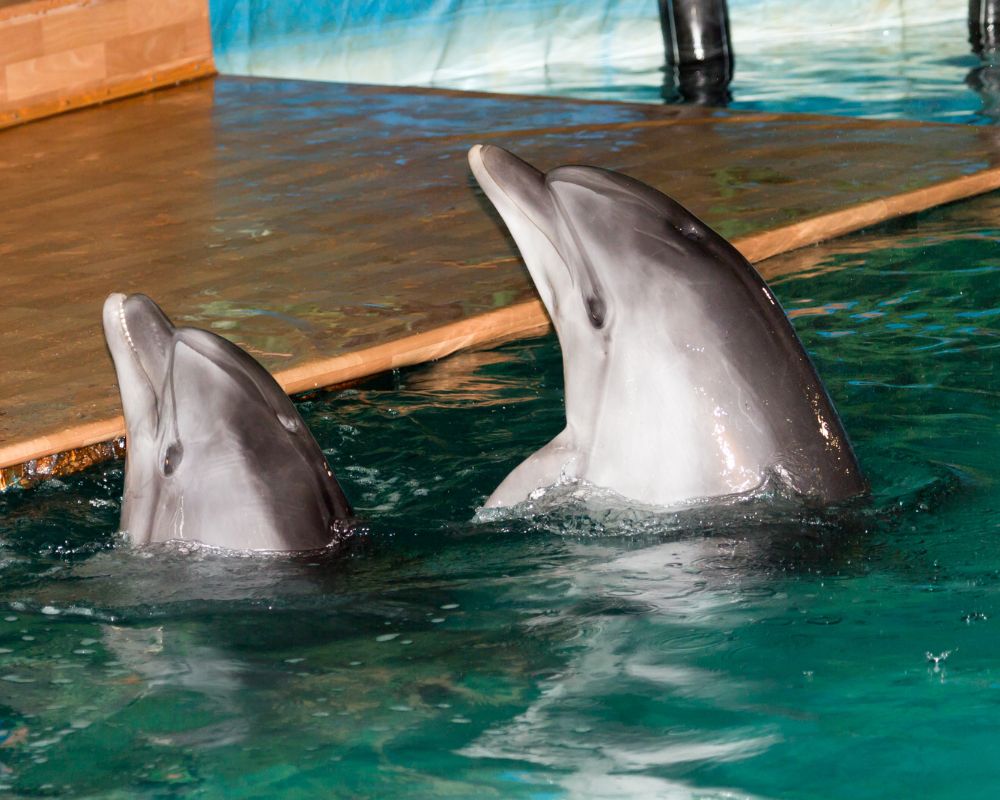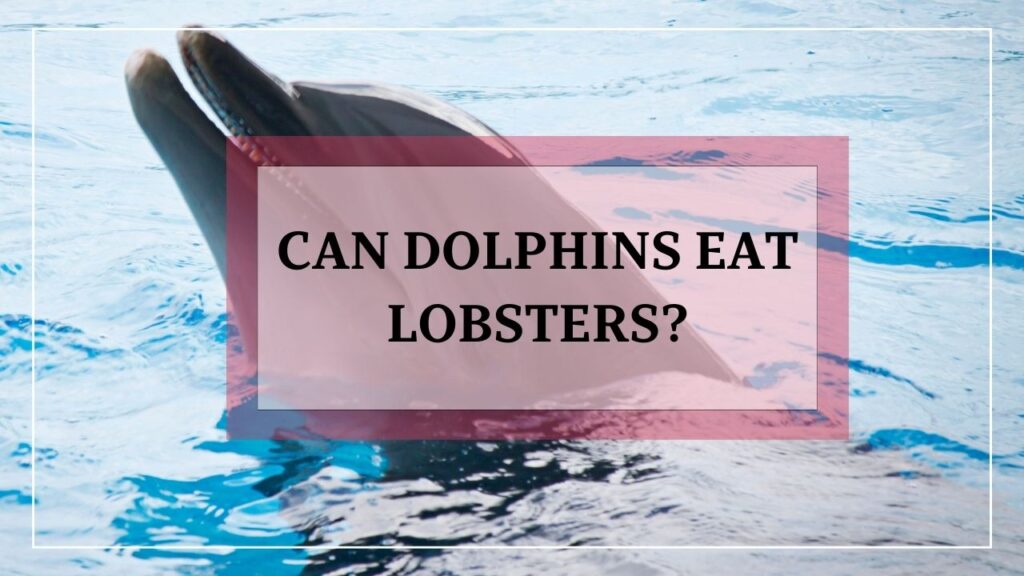Today, we’re going on an exciting adventure to learn about dolphins and what they like to eat. Have you ever wondered if dolphins enjoy munching on lobsters? Well, get ready to dive into the ocean of knowledge and find out!
Imagine you’re at the beach, watching dolphins playfully jumping in the water. Dolphins are super smart and really fun to watch! But have you ever thought about what they eat? It turns out, dolphins have a pretty interesting menu.
Now, lobsters are these cool creatures with hard shells and big claws. They’re like underwater superheroes! So, here’s the big question: Do dolphins include lobsters in their meals? We’re going to find out together!
Can Dolphins Eat Lobsters?

Ah, the intriguing question of whether dolphins can indulge in a lobster feast! Let’s dive right into it and uncover the truth.
Dolphins, those playful swimmers, have quite an adventurous palate. While they prefer fish and squid, lobsters aren’t their top choice.
However, some dolphin species, like the common bottlenose dolphin, have been seen nibbling on lobsters occasionally. But fear not lobsters! Dolphins don’t make you their main course.
Lobsters pose a challenge for dolphins. Their tough shells and sharp pincers require some clever hunting techniques. Dolphins might toss lobsters around or use their powerful tails to crack open the shells. It’s like an underwater kitchen improvisation!
The Potential Benefits of Lobster Consumption to Dolphins
Now, you might be wondering if there are any advantages for dolphins when it comes to snacking on lobsters. Let’s take a closer look at the potential benefits that lobster consumption may bring to our aquatic friends.
Nutritional Value Of Lobsters
Lobsters are packed with essential nutrients that can be beneficial to dolphins. They are a rich source of protein, which helps in building and repairing their bodies. Additionally, lobsters contain important minerals like calcium and phosphorus that contribute to healthy bone development. So, enjoying a lobster treat every now and then could provide dolphins with a nutritional boost.[1]
Ecological Significance
Dolphin-lobster interactions also have ecological significance. Lobsters play a vital role in maintaining the balance of marine ecosystems. Dolphins contribute to the natural regulation of lobster populations by consuming lobsters, helping to prevent overpopulation that could disrupt the delicate balance of the underwater world. It’s like dolphins lending a helping fin in keeping the ecosystem in check!
Cognitive Stimulation
Trying to crack open a lobster shell can be quite the mental workout for dolphins. The challenge of accessing the tasty meat inside requires problem-solving skills and cognitive stimulation. It’s like a little puzzle for our intelligent dolphin friends to solve. So, indulging in a lobster snack could provide mental exercise that keeps their minds sharp and agile.
Remember, moderation is key when it comes to lobster consumption for dolphins. While there may be potential benefits, their diet is primarily focused on other marine delicacies. Fish, squid, and a variety of ocean treats make up the main portion of their meals.
Risks Of Eating lobsters For Dolphins
While lobsters may seem tempting, there are a few factors that dolphins need to consider.
Challenging Shell
Lobsters have a tough exoskeleton or outer shell, that can be quite a challenge for dolphins to crack open. Their strong pincers and hard shell can make it difficult for dolphins to access the delicious meat inside. It’s like trying to open a stubborn jar without a jar opener! So, dolphins may need to put in extra effort and use their clever hunting techniques to enjoy a lobster snack.
Potential Injury
Dealing with lobsters can be a bit risky for our dolphin friends. Those sharp pincers can pack a punch, and if dolphins aren’t careful, they could end up with a pinch or two. It’s like going into battle with a spiky knight! Dolphins need to be cautious and skillful to avoid any injuries while trying to enjoy their lobster treat.
Nutritional Balance
While lobsters offer some nutritional benefits, it’s important for dolphins to maintain a balanced diet. They rely on a variety of marine foods, including fish and squid, to meet their nutritional needs. Depending too heavily on lobsters could result in an imbalance in their nutrient intake. It’s like having too much of a good thing and missing out on other important nutrients.
Availability And Hunting Effort
Finding lobsters may not always be easy for dolphins. Lobsters have their own hiding spots, and dolphins need to invest time and energy in hunting them down. It’s like playing hide-and-seek with an underwater crustacean! So, dolphins may have to put in extra effort to locate and catch lobsters, which can divert their attention and energy from other food sources.
Factors Affecting Dolphins Eating Lobsters
When it comes to dolphins indulging in a lobster meal, several factors come into play. Let’s dive into the depths and explore these fascinating factors that can influence a dolphin’s decision to snack on some tasty crustaceans.
1. Species and Personal Preference
Different dolphin species have different tastes and preferences. While some dolphins may be more inclined to give lobsters a try, others might prefer sticking to their favorite fishy delights. It’s like how some people love trying adventurous foods, while others stick to their tried-and-true favorites. Dolphins, like us, have their own unique preferences too!
2. Feeding Opportunities
Dolphins are opportunistic hunters, which means they take advantage of whatever food sources are readily available to them. If lobsters happen to be abundant in their environment, dolphins might seize the opportunity to satisfy their curiosity and appetite. It’s like stumbling upon a surprise treat in the back of your pantry and deciding to give it a go!
3. Hunting Techniques and Skills
Dolphins are highly intelligent and skilled hunters. Their creative hunting techniques come into play when dealing with lobsters. They might use their snouts to nudge the lobsters or employ their powerful tails to give them a playful tap. It’s like watching a clever magician perform tricks to capture their prey. The hunting skills and techniques of dolphins play a crucial role in their ability to catch and enjoy lobsters.
4. Seasonal Variations
Just like humans have seasonal preferences for certain foods, dolphins may also experience variations in their food choices throughout the year. The availability of different prey species can vary with the seasons, influencing the likelihood of dolphins encountering lobsters. So, while dolphins may snack on lobsters during one season, they may focus on other delicacies during different times of the year.
5. Ecological Factors
The ecological balance of the marine ecosystem also influences a dolphin’s access to lobsters. Factors such as water temperature, currents, and habitat conditions can impact the distribution and abundance of lobsters.
It’s like the ocean’s own culinary game, with various factors determining whether lobsters are on the menu for dolphins at a particular time and place.
In the intricate world of dolphins and their dining choices, these factors come together to shape their encounters with lobsters.
While some dolphins may take a keen interest in lobster cuisine, others may opt for different underwater delicacies based on their personal preferences, hunting skills, and the availability of prey species.
Conclusion
In conclusion, the relationship between dolphins and lobsters is a fascinating one. While dolphins may occasionally snack on lobsters, it is not their main source of sustenance.
They have a diverse diet that primarily consists of fish, squid, and other marine delicacies. Lobsters present a unique challenge to dolphins due to their tough shells and sharp pincers, requiring clever hunting techniques to enjoy the tasty meat inside.

